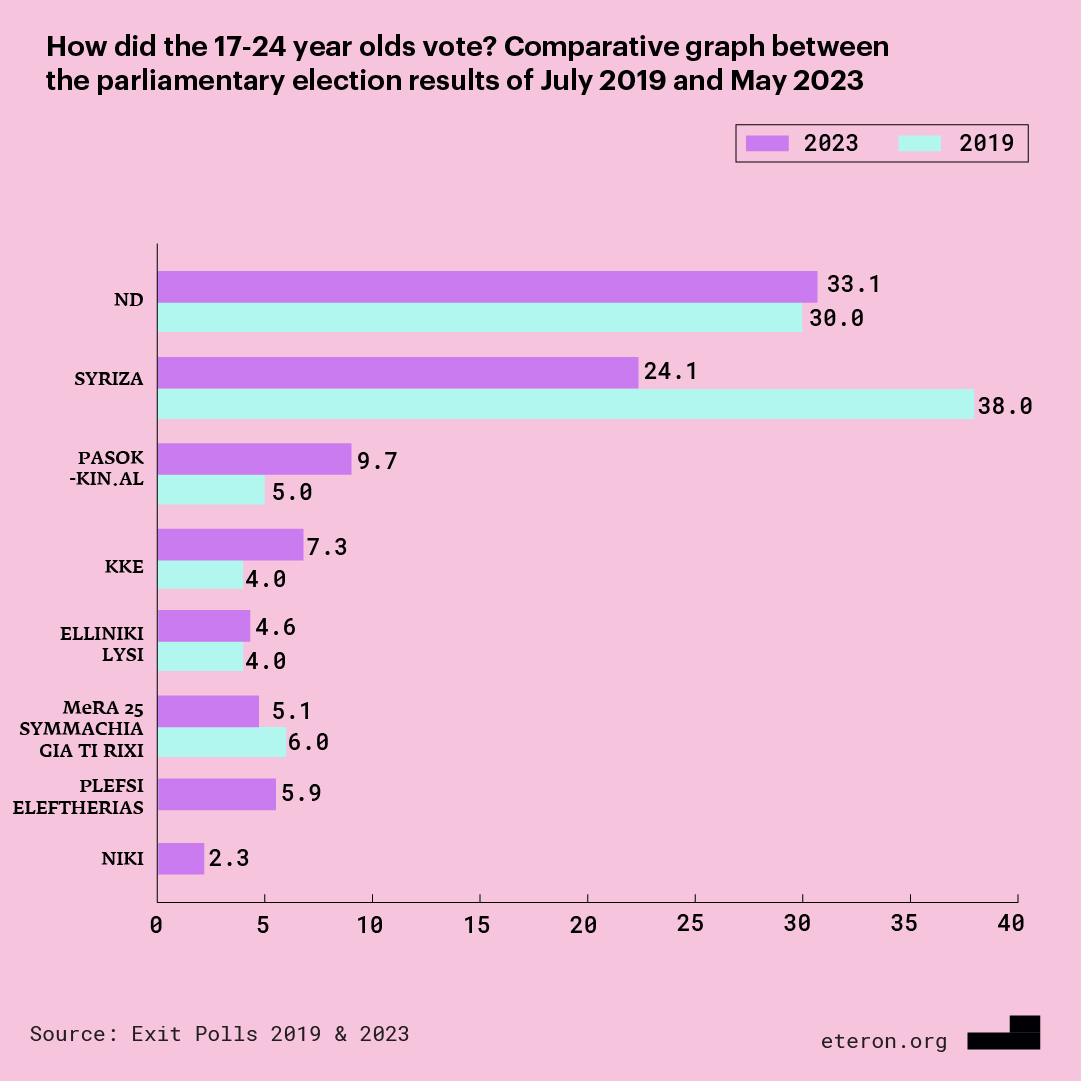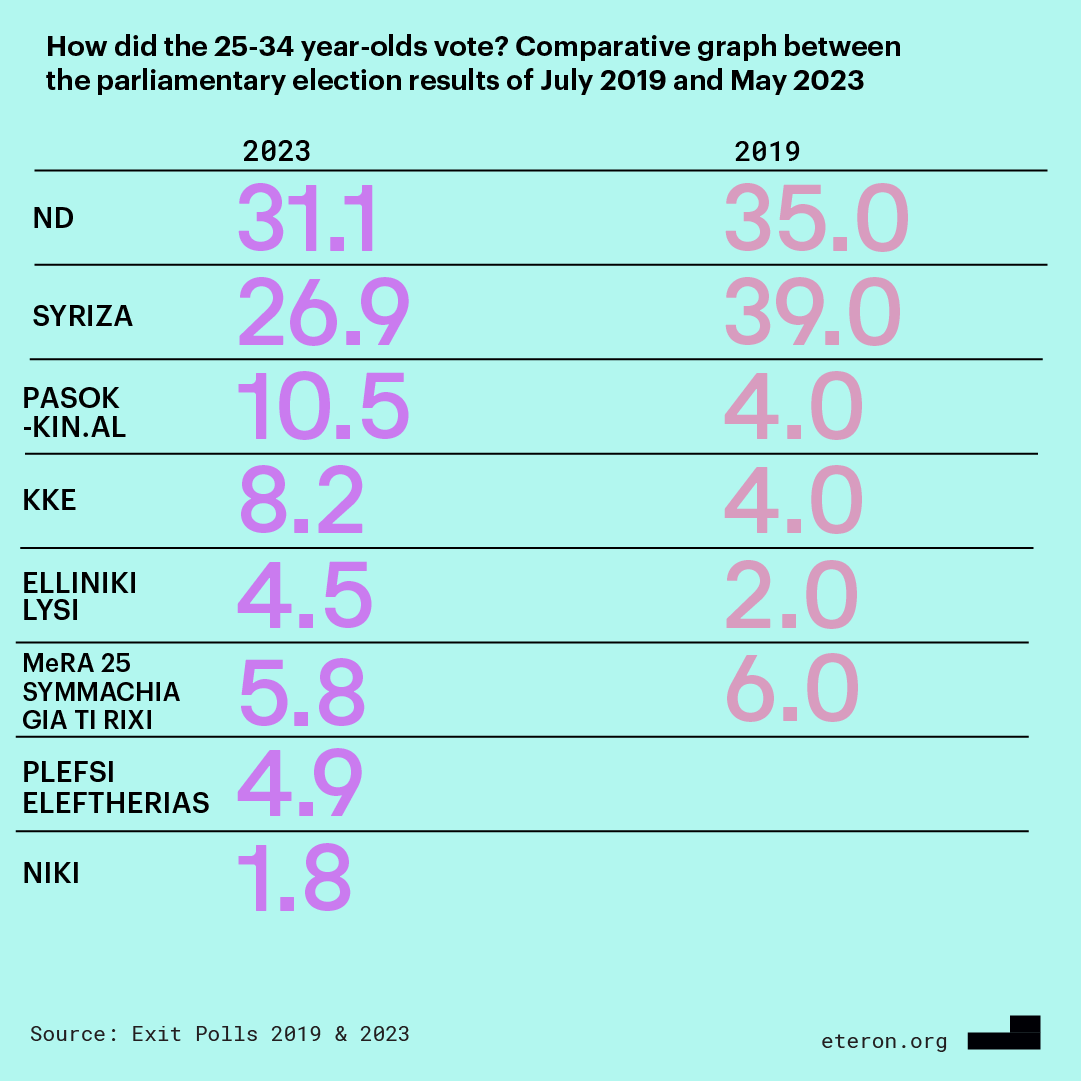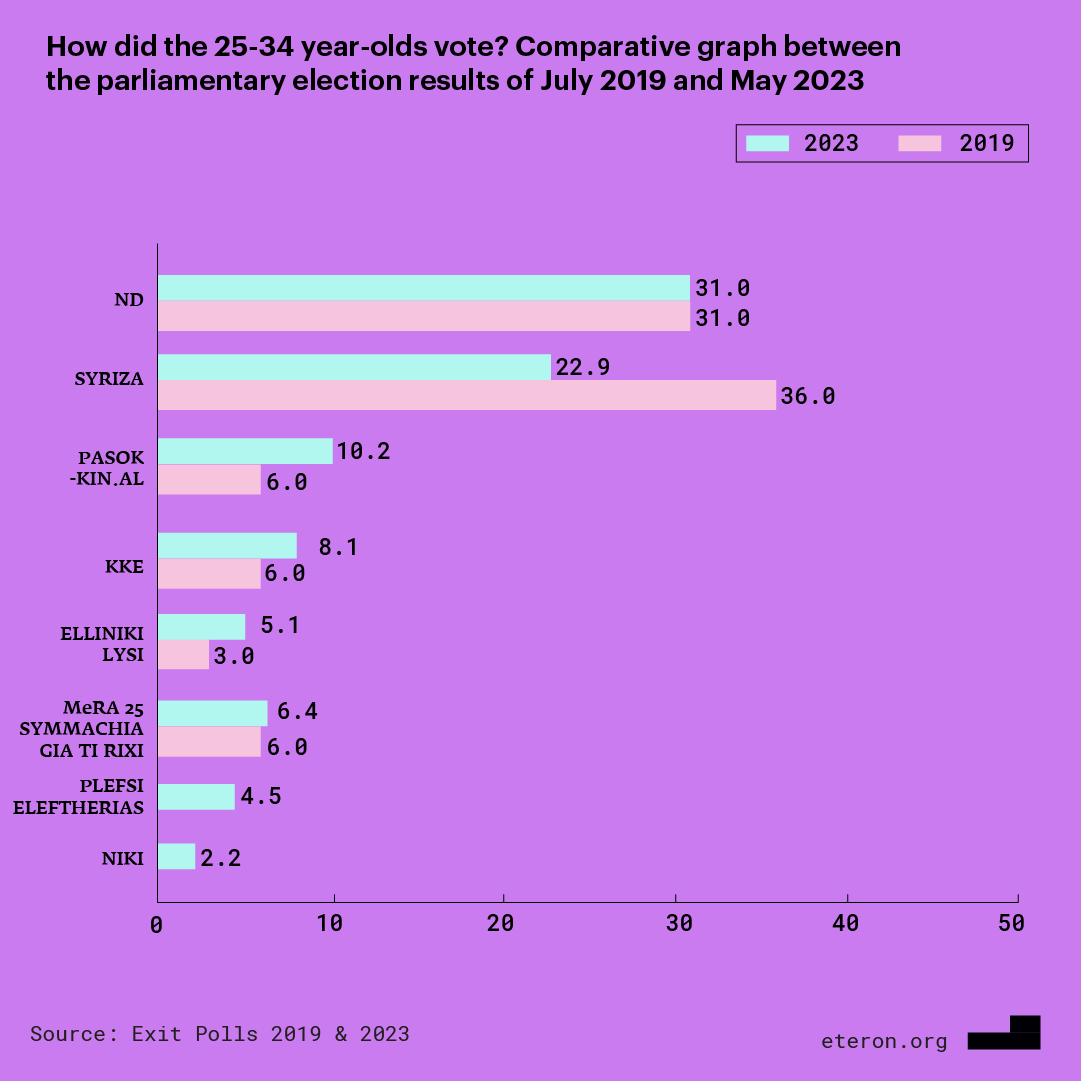
The youth vote, the Exit Polls and the day ahead: Opening the dialogue
The elections of May 21 resulted in a sweeping victory (40.79%) for NEA DIMOKRATIA – ND (New Democracy) and a crushing defeat for SYRIZA – PROODEFTIKI SYMMACHIA (20.7%). PASOK – KINIMA ALLAGIS (11.46%) increased its share by more than 3 percentage points compared to the 2019 parliamentary elections, and managed to come second in six regions. KOMMOUNISTIKO KOMMA ELLADAS – KKE (Communist Party of Greece) won 126,174 more votes, reaching 7.23%.
ELLINIKI LYSI (Hellenic Solution) rose from 3.7% to 4.45%, while MeRA25-SYMMACHIA GIA TI RIXI (Alliance for Rupture) failed to gain seats in the Parliament, as it received 2.63% of the total votes. Niki (Victory) (2.92%) and PLEFSI ELEFTHERIAS (Course of Freedom) (2.89%) came very close to entering the Parliament, while the total percentage of votes for parties that didn’t reach the 3% threshold and were therefore left out of the Parliament was 16.1%.
Consequently, all the political parties as well as society as a whole, each from their own perspective and standpoint, have all been engaging in conversations regarding interpretations of the election results. At the same time, given the fact that no government has emerged, Greece has already entered a new pre-election period in view of the parliamentary elections of June 25th.
In this context, as part of the “Youth – Voice On” project, we shall focus our attention on the vote of young people aged 17-34, as reflected in the exit poll.
The youth vote in 2019 and 2023: A comparative recording
We compared the voting choices of the young generation, as obtained from the exit polls in the parliamentary elections of 2019 and May 2023, and recorded the performance of the political parties: a. amongst 17-24 year olds (graph 1), b. more specifically amongst students (graph 2) and c. amongst 25-34 year olds (graph 3).
ND is the top performer across all three of the above-mentioned age groups. Its share of the vote amongst those aged 17-24 is 33.1%, an increase of 3.1 percentage points compared to the 2019 parliamentary elections. On the other hand, in the student vote, ND’s strength dropped from 35% in 2019 to 31.1% in May 2023. Finally, amongst 25-34-year-olds, it registers 31%, the exact same percentage as in 2019.
Although in the young generation, ND is almost 10 percentage points below its overall figures, the fact remains that – with the exception of the student vote – it has not suffered any damage and it managed to come first in parliamentary elections among the younger age groups after many years.

Graph 1
SYRIZA is clearly the defeated party when it comes to the young people’s vote. Compared to the 2019 parliamentary elections, it recorded drops in all the age groups (by 13.9 percentage points in the 17-24 age group, 12.1 in the student vote and 13.1 in the 25-34 age group). It therefore came in second place with 24.1% (17-24 year olds), 26.9% (students) and 22.9% (25-34 year olds). It is worth mentioning that in all parliamentary elections since 2012, SYRIZA has been comfortably in first place amongst the younger generation, with the exception of the 2019 European elections.
PASOK – KIN.AL. is recording a significant increase in its electoral influence amongst young people. More specifically, according to the results of the exit poll, PASOK got a 9.7% share in the 17-24 age group (+4.7 percentage points), 10.5% of the student vote (+6.5) and 10.2% in the 25-34 age group (+4.2).

Graph 2
KKE is also gaining ground among the young generation. In the 17-24 age group it obtained 7.3% of the vote, with a 3.3 percentage points increase compared to the 2019 parliamentary elections. Similarly, in the 25-34 age group, it registered 8.1% (+ 2.1 percentage points), while, amongst students, the Communist Party of Greece (KKE) registered the second highest rate with 8.2% (+ 4.2). Moreover, on the subject of the significant rise of the KKE in the student vote, it is worth noting that its student party branch, Panspoudastiki, has won the past two student elections.
ELLINIKI LYSI got 4.6% of the 17-24 year olds’ votes. Amongst students its share rose from 2% to 4.5% and in the 25-34 age group it increased by 2.1 points reaching 5.1%.
Although MeRA25 – SYMMACHIA GIA TI RIXI failed to win the votes that would grant it parliamentary seats in the May 2023 elections, it still kept the same increased percentages that it had in the 2019 parliamentary elections amongst the young generation. More specifically, it registered a 5.1% share in the 17-24 age group, a 5.8% share of the student vote, and a 6.4% share in the 25-34 age group.

Graph 3
PLEFSI ELEFTHERIAS got a surprisingly high percentage of the young generation’s vote, more specifically 5.9% among those aged 17-24, 4.9% of the student vote and 4.5% amongst 25-34 year olds. Although Course of Freedom did run in 2019, there isn’t any data available on its results in the younger generation. Its electorate that belongs to the age groups we are currently focusing on is still largely uncharted.
Finally, the far-right NIKI party ran for the first time in May 2023 and underperformed in the younger generation, registering 2.3% in the 17-24 age group, 1.8% amongst students and 2.2% in the 25-34 age group.
Please Mind the Gap: The election results, public opinion surveys and the missing perspective
The recording of the results that we presented in the form of comparative graphs, was based on the joint exit poll (by the polling agencies Metron Analysis, Alco, Marc, MRB & GPO) for the 2019 parliamentary elections, as well as for the May 21, 2023 elections. In the May 2023 election, the survey was conducted on a representative sample of 5,946 voters, with face-to-face interviews outside 90 polling stations nationwide. For both 2019 and 2023, we sourced the results from the joint exit poll Results Report, available from Metron Analysis.
The clarifications that will follow are even more significant, as most of the articles and studies that were published after the May 21st elections are based on the initial – immediately after the polls closed – rather than on the final exit poll results, which are much more accurate and closer to the actual results.
At this point, it is worth taking a closer look at exit polls and their history, focusing on the methodology of their findings’ interpretation. For this reason, what could be more useful than to return to earlier remarks and advice on methodology by the political scientist, professor and pollster Ilias Nikolakopoulos, whose sudden loss at the end of June last year was a major blow to scientific research. Nikolakopoulos was, after all, the man who introduced “exit polls” in Greek elections back in 1994.
Practically, exit polls are second ballot boxes set up outside a representative sample of polling stations, where, after having voted, a number of people are invited to fill in a questionnaire with information regarding their gender, age, education, etc., as well as the party they have just voted for. Although this innovative method was considered to be a total success when it was first introduced, as Ιlias Nikolakopoulos explained in an interview at VIMA newspaper back then, we should not overestimate the value of its advantages, as no poll can in fact serve as a 100% accurate recording of the results. Instead of seeking the magic figure of the political parties’ final rates, Nikolakopoulos stressed that surveys indicate “phenomena trends” and give us opportunities to make further estimates.
In a similar vein, in an interview published at NEA newspaper back in 2002, the great political scientist stated that “the problem with political polls is that all interested parties as well as the general public demand a level of accuracy that no statistical theory can possibly guarantee”. When asked what the recipe for success is, interestingly, he replied: “It is necessary to have composure, a certain ‘distance’ and a clear mind. But still, one also needs luck.”
Ilias Nikolakopoulos described “survey saturation” as a pollster’s worst enemy and as he aptly put it, “as a rule, the people concerned are inclined to ‘read’ in a poll only the things that are positive for them and resent it when someone tries to point out any of their shortcomings”. He often made interventions in which he repeated that only the ballot box can deliver accurate messages, and pointed out the benefits one gets from re-reading opinion surveys after the elections, because “only then does one realise what they had previously misread.”
In a more recent and equally relevant intervention in 2018, Nikolakopoulos made a distinction between academic surveys on political culture and traditional polls. As he explained, political culture surveys attempt to describe the political landscape and voting intention is only one of the parameters examined. By limiting the discussion to just projections and presentations of voting intention rates for the different political parties, we tend to overlook a lot of significant information. Finally, he pointed out that, in recent years, there has been more swaying compared to the past, since many people now vote based on the current conjuncture rather than on their individual political identity.
The reason why we return today to Ilias Nikolakopoulos’ methodological remarks and advice is to give ourselves the opportunity to see the bigger picture, avoiding simple explanations, which are refuted as quickly as they are formulated. After all, the amount of times that friends and colleagues have recently commented on how big a loss Ilias Nikolakopoulos’s sober and penetrating gaze is in the analyses of the election results is indicative of his contribution to the field.
Obviously, discussions both about Exit Polls (e.g the Association of Greek Market & Opinion Research Companies –SEDEA– Press Release on 23/5/2023) and opinion polls/ surveys are still taking place, and that’s a good thing in itself. Besides, despite the fact that ND’s victory wasn’t with as high a margin amongst young people as it was in the case of other age groups, it is still true that the polls predicting a comfortable lead for SYRIZA by more than 5 (or even 10) percentage points amongst the younger generation proved to be wrong. Much could be said and has largely already been said about weightings, the imponderable factor of young people’s voting behaviour, people who voted for the first time in their lives, those who decided who to vote for on election day, etc.
In any case, often the refutation that results from opinion polls and public opinion surveys in general, has more to do with the false expectations that are cultivated in public opinion and the devaluation of surveys through their exploitation for political and communication reasons.
Starting a dialogue on the new generation in the light of the election results
This paper does not aim to provide comprehensive interpretations of the results. After all, after such post-election conclusions, the last thing one needs is certitudes about the electorate’s behaviour. Following the research on the young generation, the objective of the present piece was, on the one hand, to present the electoral results through their comparative recording based on the July 2019 and the May 2023 exit polls and, secondly, to serve as a preamble to the discussion that we will be hosting in the coming weeks on Eteron’s website as part of the “Youth – Voice On” project.
Eteron’s researches have so far been conducted within the framework of structured and long-term projects, combined with networking initiatives and collaborations aiming to delve deeper into the topics and focus areas of each research project. For example, as part of the “Gen Z – Voice On” project, we hosted an extensive dialogue in the form of articles and interviews with researchers and other interested parties both from Greece and abroad, which we compiled in Eteron’s first e-book titled: “Gen Z, Politics & Social Media during the Pandemic: Research Findings and Commentary”. Furthermore, we focused on participatory, interactive initiatives aiming to co-produce knowledge with young people, as well as material such as the presentations and workshops that were organised at Eteron’s premises in Athens in spring 2022, and the Gen Z Unmuted video series. Finally, we engaged in multiple synergies with Institutes, Universities, cultural associations and other institutions and participated in events, seminars and conferences in Greece and abroad.
Now, with Eteron’s new project “Youth – Voice On”, our goal is to outline the young generation’s profile for a broader age range (people aged 17-34), by recording, analysing and discussing young people’s stances on a number of political, value and ideological issues, such as: institutions, democracy, the economy, immigration, gender issues and expectations for the future. This new project was launched in early May 2023 with the publication of the research “The political profile of young people after the Tempi Train Tragedy: Emotions, ideological identification and expectations”, under the scientific supervision of Loukia Kotronaki, and focused on the participation of young people in the large mobilisations in March 2023 as well as on their emotions, opinions and ideological-political references. At the same time, we drew data from Eteron’s and aboutpeople’s large-scale research “An Insight into the Minds of Voters” (April 2023) and attempted a mapping of the young generation through a comparative study of the data and by highlighting trends, unresolved issues and uncharted territories.
Although we have chosen not to include voting intention in Eteron’s surveys, the research findings regarding the younger generation allow for interesting correlations with the election results. Undoubtedly, many findings confirm young people’s active participation in collective actions and their overall familiarity with movement action repertoires, their increased empathy, solidarity and awareness regarding issues of labour precarity, gender equality, LGBTQI+ rights, police brutality, etc. On the other hand, the young generation is not homogenised in its views and practices and we have identified several disparities in their positions depending on the topic.
For example, on every possible occasion, we reiterate through our analyses that it would be wrong to underestimate the visible and invisible effects of neoliberalism on the young generation, especially given the fact that in our research, when asked about their ideological-political stances, the most popular response was “None (no ideology) – I believe in the individual”. Moreover, despite the clear identification and manifestation of the majoritarian democratic and anti-fascist reflexes of the young generation, we also detected a minoritarian but still existing far-right influence zone, with the most recent significant relevant finding being that 14.6% of young people agree & somewhat agree with the view that in some cases dictatorship is preferable to democracy. Lastly, we have brought to the fore the significant impact of the conservative agenda on issues around immigration as well as the need for systematic work to combat xenophobia amongst the younger generation.
When it comes to the issues that influenced the youth vote in the May 2023 elections, Eteron’s research revealed that inflation and expensiveness were in first place, the economy and growth came in second, while the train accident in Tempi was fourth and wiretapping in seventh (last) place. This trend is also confirmed at a general population level according to the survey “Why we voted as we did” conducted on election day by aboutpeople (on behalf of NEWS24/7) with citizens who participated in the May 21st elections. In terms of voting criteria, it turns out that in the top three positions were the better operation of the State, the economy and national issues, while the lowest scoring options were the wiretapping scandal and the Tempi accident.
More specifically, the aboutpeople survey shows that most young people aged 17-34 voted negatively, with 58.2% saying they voted for the “least bad” party, while only 38.3% voted for the party they thought was the best. Furthermore, 54.7% of young people said they were confident about the party they were going to vote for before going to the polling station, while 43.8% said they “hesitated between different political parties”. Finally, given the fact that we don’t have specific data on youth abstention in elections -let alone the attributes of those who abstained- the following finding in the aboutpeople survey is very interesting: 87.2% of young people who voted on May 21st said they definitely intend to vote in the next general election.
In conclusion, it makes a lot of sense to follow the advice of Ilias Nikolakopoulos to return time and time again to our research findings and to review them in the light of the election results, both those of the 21st of May and those that are coming up on the 25th of June. In light of all of the above and based on the “The political profile of young people after the Tempi Train Tragedy: Emotions, ideological identification and expectations” research, we have reached out to a wide range of people and in the coming period we will host dialogue texts, elaborating on some of the research topics, making comparisons with other available researches on the new generation, commenting on the findings and integrating them into a broader dialogue.
One thing is certain: the stakes for the young generation in the day ahead are particularly high, and the same goes for the challenges that await.



